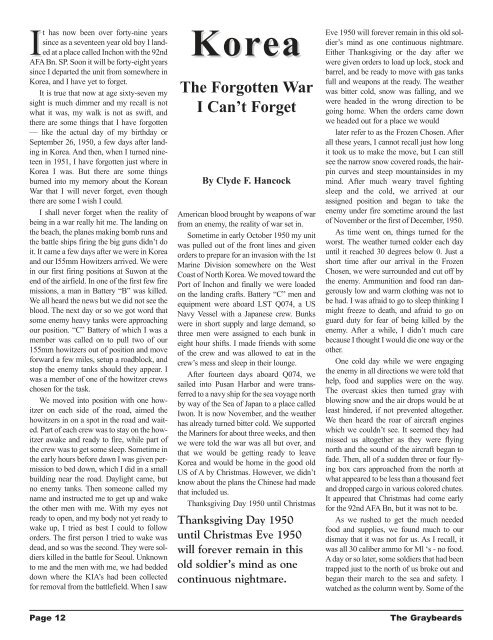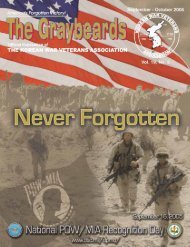The Graybeards - KWVA - Korean War Veterans Association
The Graybeards - KWVA - Korean War Veterans Association
The Graybeards - KWVA - Korean War Veterans Association
Create successful ePaper yourself
Turn your PDF publications into a flip-book with our unique Google optimized e-Paper software.
It has now been over forty-nine years<br />
since as a seventeen year old boy I landed<br />
at a place called Inchon with the 92nd<br />
AFA Bn. SP. Soon it will be forty-eight years<br />
since I departed the unit from somewhere in<br />
Korea, and I have yet to forget.<br />
It is true that now at age sixty-seven my<br />
sight is much dimmer and my recall is not<br />
what it was, my walk is not as swift, and<br />
there are some things that I have forgotten<br />
— like the actual day of my birthday or<br />
September 26, 1950, a few days after landing<br />
in Korea. And then, when I turned nineteen<br />
in 1951, I have forgotten just where in<br />
Korea I was. But there are some things<br />
burned into my memory about the <strong>Korean</strong><br />
<strong>War</strong> that I will never forget, even though<br />
there are some I wish I could.<br />
I shall never forget when the reality of<br />
being in a war really hit me. <strong>The</strong> landing on<br />
the beach, the planes making bomb runs and<br />
the battle ships firing the big guns didn’t do<br />
it. It came a few days after we were in Korea<br />
and our I55mm Howitzers arrived. We were<br />
in our first firing positions at Suwon at the<br />
end of the airfield. In one of the first few fire<br />
missions, a man in Battery “B” was killed.<br />
We all heard the news but we did not see the<br />
blood. <strong>The</strong> next day or so we got word that<br />
some enemy heavy tanks were approaching<br />
our position. “C” Battery of which I was a<br />
member was called on to pull two of our<br />
155mm howitzers out of position and move<br />
forward a few miles, setup a roadblock, and<br />
stop the enemy tanks should they appear. I<br />
was a member of one of the howitzer crews<br />
chosen for the task.<br />
We moved into position with one howitzer<br />
on each side of the road, aimed the<br />
howitzers in on a spot in the road and waited.<br />
Part of each crew was to stay on the howitzer<br />
awake and ready to fire, while part of<br />
the crew was to get some sleep. Sometime in<br />
the early hours before dawn I was given permission<br />
to bed down, which I did in a small<br />
building near the road. Daylight came, but<br />
no enemy tanks. <strong>The</strong>n someone called my<br />
name and instructed me to get up and wake<br />
the other men with me. With my eyes not<br />
ready to open, and my body not yet ready to<br />
wake up, I tried as best I could to follow<br />
orders. <strong>The</strong> first person I tried to wake was<br />
dead, and so was the second. <strong>The</strong>y were soldiers<br />
killed in the battle for Seoul. Unknown<br />
to me and the men with me, we had bedded<br />
down where the KIA’s had been collected<br />
for removal from the battlefield. When I saw<br />
Korea<br />
<strong>The</strong> Forgotten <strong>War</strong><br />
I Can’t Forget<br />
By Clyde F. Hancock<br />
American blood brought by weapons of war<br />
from an enemy, the reality of war set in.<br />
Sometime in early October 1950 my unit<br />
was pulled out of the front lines and given<br />
orders to prepare for an invasion with the 1st<br />
Marine Division somewhere on the West<br />
Coast of North Korea. We moved toward the<br />
Port of Inchon and finally we were loaded<br />
on the landing crafts. Battery “C” men and<br />
equipment were aboard LST Q074, a US<br />
Navy Vessel with a Japanese crew. Bunks<br />
were in short supply and large demand, so<br />
three men were assigned to each bunk in<br />
eight hour shifts. I made friends with some<br />
of the crew and was allowed to eat in the<br />
crew’s mess and sleep in their lounge.<br />
After fourteen days aboard Q074, we<br />
sailed into Pusan Harbor and were transferred<br />
to a navy ship for the sea voyage north<br />
by way of the Sea of Japan to a place called<br />
Iwon. It is now November, and the weather<br />
has already turned bitter cold. We supported<br />
the Mariners for about three weeks, and then<br />
we were told the war was all but over, and<br />
that we would be getting ready to leave<br />
Korea and would be home in the good old<br />
US of A by Christmas. However, we didn’t<br />
know about the plans the Chinese had made<br />
that included us.<br />
Thanksgiving Day 1950 until Christmas<br />
Thanksgiving Day 1950<br />
until Christmas Eve 1950<br />
will forever remain in this<br />
old soldier’s mind as one<br />
continuous nightmare.<br />
Eve 1950 will forever remain in this old soldier’s<br />
mind as one continuous nightmare.<br />
Either Thanksgiving or the day after we<br />
were given orders to load up lock, stock and<br />
barrel, and be ready to move with gas tanks<br />
full and weapons at the ready. <strong>The</strong> weather<br />
was bitter cold, snow was falling, and we<br />
were headed in the wrong direction to be<br />
going home. When the orders came down<br />
we headed out for a place we would<br />
later refer to as the Frozen Chosen. After<br />
all these years, I cannot recall just how long<br />
it took us to make the move, but I can still<br />
see the narrow snow covered roads, the hairpin<br />
curves and steep mountainsides in my<br />
mind. After much weary travel fighting<br />
sleep and the cold, we arrived at our<br />
assigned position and began to take the<br />
enemy under fire sometime around the last<br />
of November or the first of December, 1950.<br />
As time went on, things turned for the<br />
worst. <strong>The</strong> weather turned colder each day<br />
until it reached 30 degrees below 0. Just a<br />
short time after our arrival in the Frozen<br />
Chosen, we were surrounded and cut off by<br />
the enemy. Ammunition and food ran dangerously<br />
low and warm clothing was not to<br />
be had. I was afraid to go to sleep thinking I<br />
might freeze to death, and afraid to go on<br />
guard duty for fear of being killed by the<br />
enemy. After a while, I didn’t much care<br />
because I thought I would die one way or the<br />
other.<br />
One cold day while we were engaging<br />
the enemy in all directions we were told that<br />
help, food and supplies were on the way.<br />
<strong>The</strong> overcast skies then turned gray with<br />
blowing snow and the air drops would be at<br />
least hindered, if not prevented altogether.<br />
We then heard the roar of aircraft engines<br />
which we couldn’t see. It seemed they had<br />
missed us altogether as they were flying<br />
north and the sound of the aircraft began to<br />
fade. <strong>The</strong>n, all of a sudden three or four flying<br />
box cars approached from the north at<br />
what appeared to be less than a thousand feet<br />
and dropped cargo in various colored chutes.<br />
It appeared that Christmas had come early<br />
for the 92nd AFA Bn, but it was not to be.<br />
As we rushed to get the much needed<br />
food and supplies, we found much to our<br />
dismay that it was not for us. As I recall, it<br />
was all 30 caliber ammo for Ml ‘s - no food.<br />
A day or so later, some soldiers that had been<br />
trapped just to the north of us broke out and<br />
began their march to the sea and safety. I<br />
watched as the column went by. Some of the<br />
Page 12<br />
<strong>The</strong> <strong>Graybeards</strong>

















